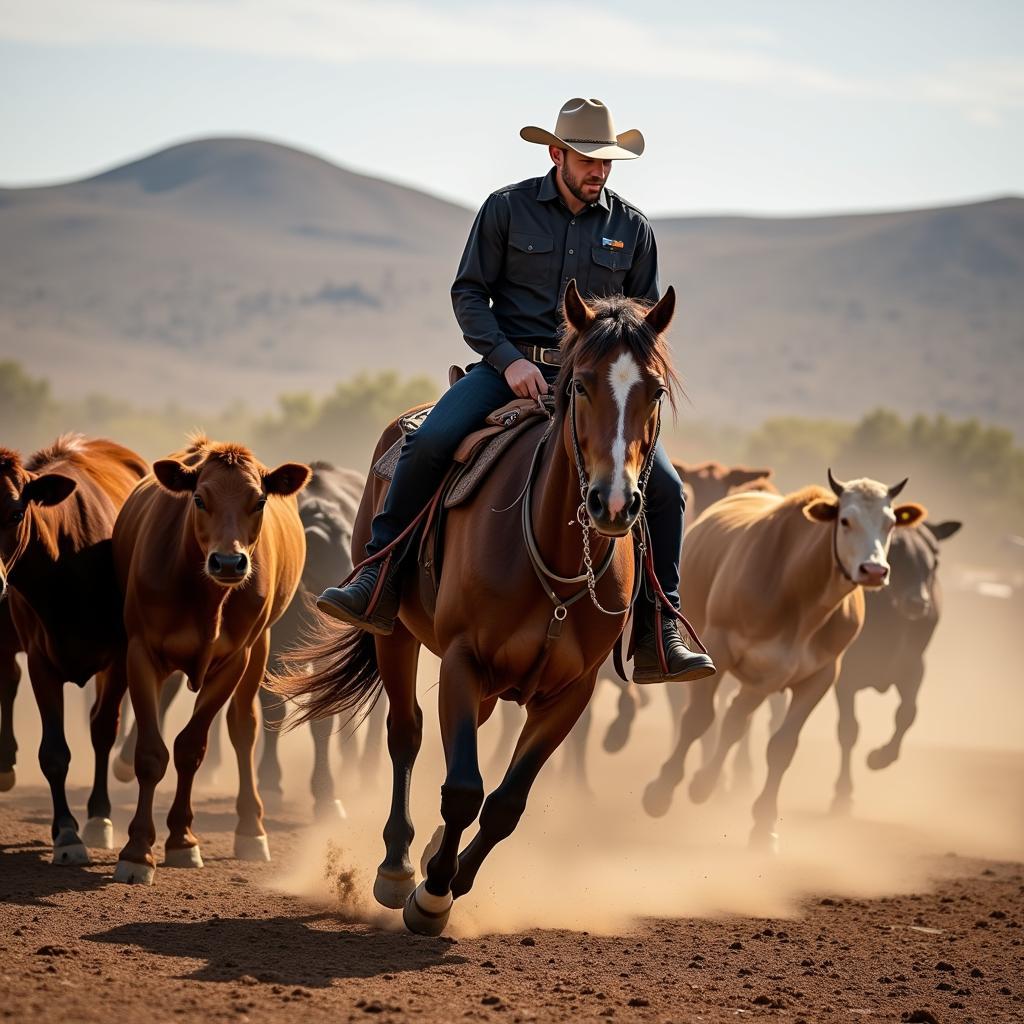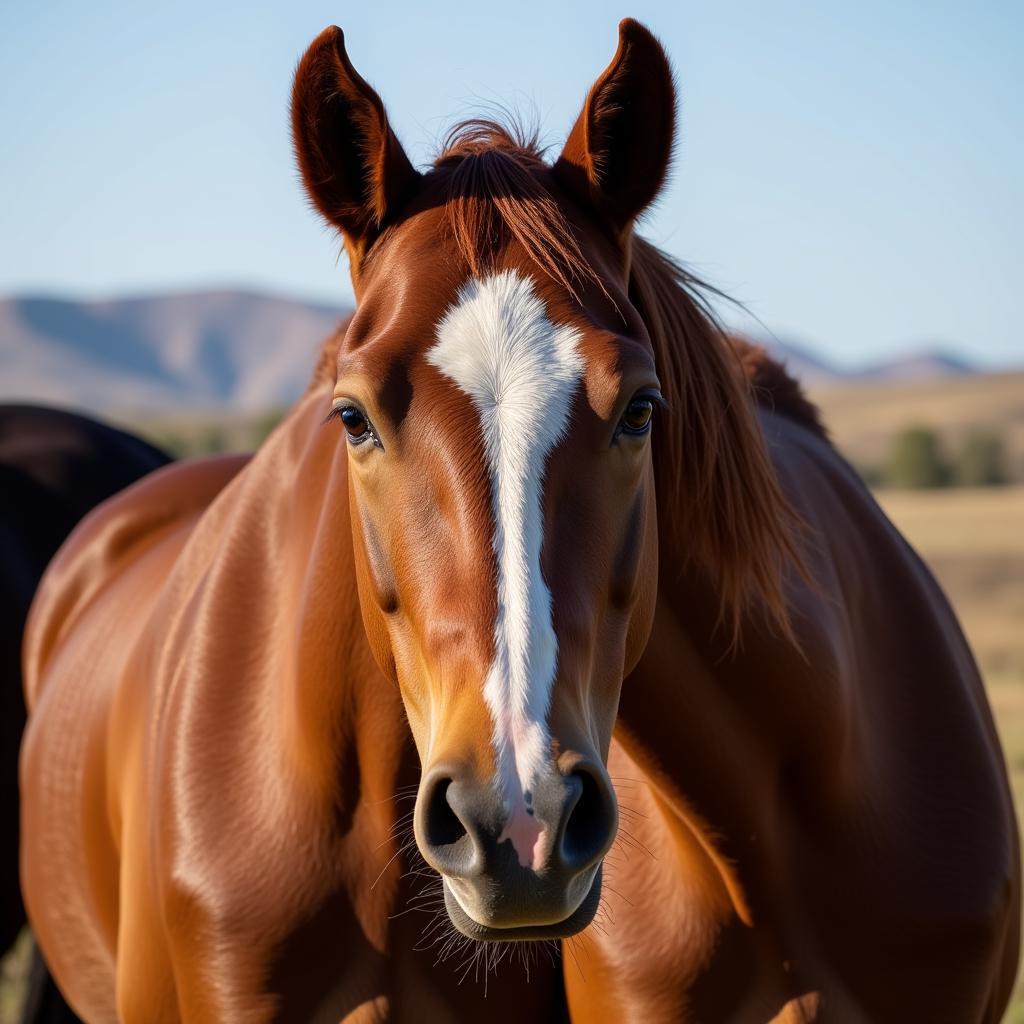Cow-bred horses, often misunderstood, represent a unique blend of athleticism and versatility. This article delves into the fascinating world of these horses, exploring their origins, characteristics, and potential applications in various disciplines. We’ll unravel the common misconceptions surrounding cow-bred horses and provide insights into their training and care.
 Cow-bred horse expertly maneuvering cattle in a ranch setting
Cow-bred horse expertly maneuvering cattle in a ranch setting
Horses bred for working cattle often possess a natural “cow sense,” an innate ability to read and react to cattle movements. This inherent skill makes them invaluable partners in ranch work, from herding and sorting to roping and cutting. Their agility, quick reflexes, and stamina are honed through generations of working on ranches, navigating challenging terrains, and handling demanding livestock. Are cow-bred horses suitable for disciplines beyond ranch work? This is a common question that we’ll explore.
Decoding the “Cow-Bred” Label: What Does it Really Mean?
The term “cow-bred” isn’t a specific breed but rather a descriptive term indicating a horse’s lineage and training. These horses often descend from breeds known for their cow-working prowess, such as Quarter Horses, Paints, and Appaloosas. Their pedigree often includes generations of horses specifically selected for their ability to work cattle. This selective breeding process has resulted in horses with the physical and mental attributes necessary for the demanding tasks of ranch work. What makes them unique?
 Close-up portrait of a cow-bred horse, highlighting its intelligent eyes and strong features
Close-up portrait of a cow-bred horse, highlighting its intelligent eyes and strong features
Are Cow-Bred Horses Right for You?
Choosing a cow-bred horse depends on your riding goals and experience. While their inherent “cow sense” can be an asset, it also requires a rider who understands and can work with these instincts. Their sensitivity and responsiveness can be challenging for novice riders, but experienced riders often appreciate their athleticism and versatility. If you’re looking for a horse with a strong work ethic and a natural talent for working cattle, a cow-bred horse may be the perfect fit. If you’re interested in other types of riding horses, check out our guide on types of riding horses.
Training and Care: Nurturing a Cow-Bred Horse’s Potential
Training a cow-bred horse requires a balanced approach that respects its natural instincts while developing its athletic abilities. Building a strong foundation of trust and communication is crucial. Positive reinforcement methods are often effective, as these horses are typically eager to please and responsive to clear guidance. Consistent training and handling are essential for developing their full potential. Proper care, including nutrition, hoof care, and regular veterinary check-ups, ensures their well-being and longevity.
Beyond the Ranch: Exploring Other Disciplines
While cow-bred horses excel in ranch work, their athleticism and trainability make them suitable for various other disciplines. They often excel in rodeo events, such as barrel racing and team roping. Their agility and responsiveness also make them well-suited for disciplines like reining and cutting. Some riders even find them suitable for trail riding and pleasure riding. Looking for the best barrel racing horses? Consider the cow-bred option.
“A well-trained cow-bred horse can be an incredibly versatile partner,” says renowned equine trainer, Sarah Mitchell. “Their inherent athleticism and intelligence make them adaptable to a surprising range of disciplines.”
Cow-Bred Horses: A Legacy of Partnership
Cow-bred horses represent a rich tradition of partnership between humans and animals. Their inherent skills, developed through generations of selective breeding, make them invaluable partners in ranch work. Their athleticism, intelligence, and trainability also extend their potential beyond the ranch, opening doors to a variety of disciplines. Understanding their unique characteristics and providing proper training and care is key to unlocking their full potential. If you’re considering buying a horse, be sure to explore our masters equine horses for sale. We also have some excellent blackburn quarter horses available.
Are you in the Tennessee area? We have fantastic horses for sale jackson tn.
“The bond between a rider and a cow-bred horse is unlike any other,” shares seasoned rancher, John Riley. “Their responsiveness and willingness to work make them true partners in every sense of the word.”
When considering a cow-bred horse, remember that their unique characteristics require an experienced hand and a commitment to understanding their specific needs. With the right approach, these remarkable animals can become lifelong partners, enriching your riding journey in countless ways.
FAQ
- Are all cow-bred horses Quarter Horses? No, while Quarter Horses are common, other breeds like Paints and Appaloosas can also be cow-bred.
- What is “cow sense”? It’s an innate ability to read and react to cattle movements.
- Are cow-bred horses good for beginners? They can be challenging due to their sensitivity and responsiveness.
- Can cow-bred horses be used for disciplines other than ranch work? Yes, they excel in rodeo events, reining, cutting, and sometimes even trail riding.
- What is the key to training a cow-bred horse? Building trust, using positive reinforcement, and consistent handling.
For assistance, contact us at Phone Number: 0772127271, Email: justushorses@gmail.com or visit us at QGM2+WX2, Vị Trung, Vị Thuỷ, Hậu Giang, Vietnam. We have a 24/7 customer service team.